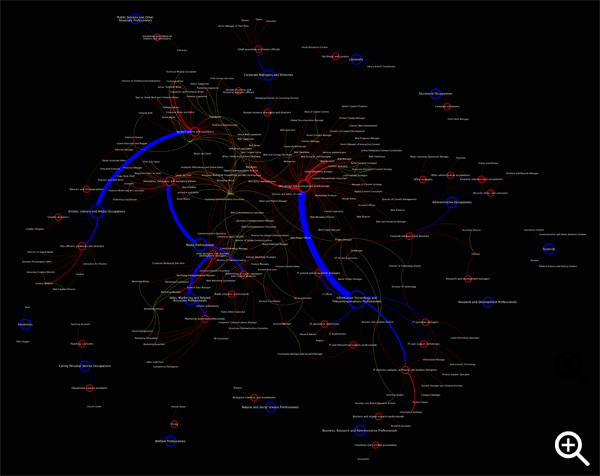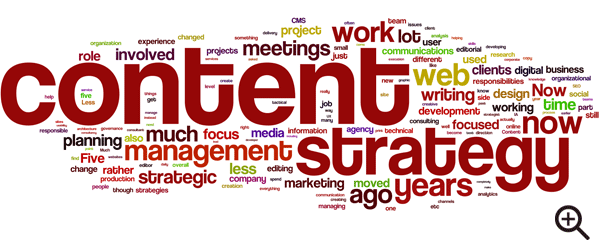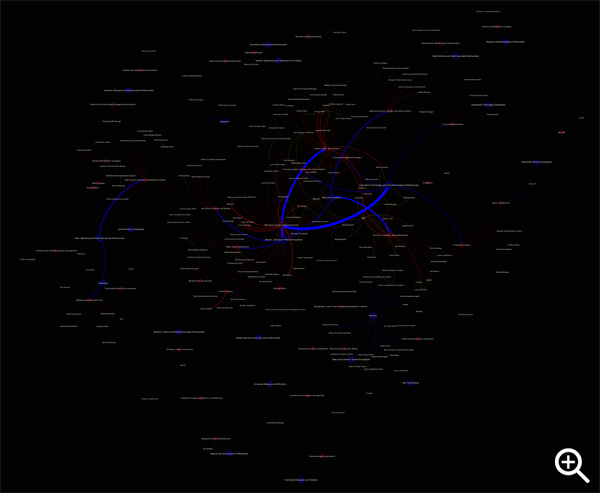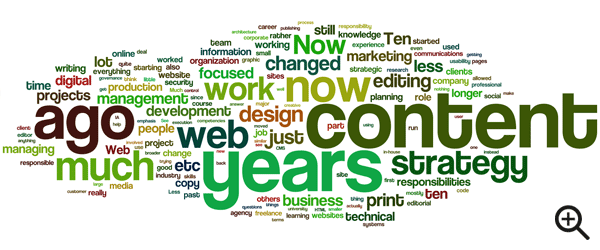Content strategy survey results: part 5
Despite failing to dangle a carrot of any real significance, a fair number of you kindly responded to my survey of web content professionals earlier this year. I’ve since prodded the resulting spreadsheet a number of times with a stick to see what moved, before detailing my findings in a series of posts. So far, I’ve revealed who and where we all are, where we work and where our talents lie, which tasks we’re more likely to take on and how closely we believe our educational backgrounds have impacted on our careers. Now, in what marks the final post of this series, I reveal what we were up to in our careers five and ten years ago and the extent to which we believe these points in time have impacted on our work today.
The professional backgrounds of content strategists
Q10. To what extent does your work now relate to what you were doing five years ago?
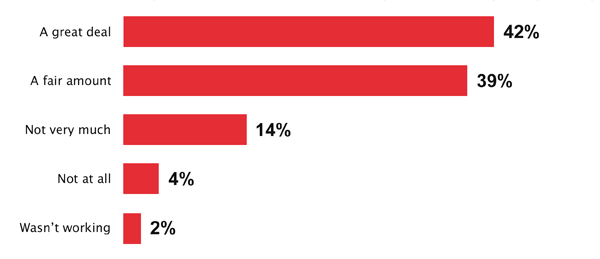
Key findings
- While it’s not a huge surprise to learn that a combined 81% of all respondents considered the role they were in five years ago had “A great deal” and “A fair amount” of relevance to what they are doing now, you may be a little more interested to learn that 12% more females than males felt this way
Data summary for professional relevance in 2006
| Extent of professional relevance | # | % |
|---|---|---|
| Total | 265 | 100 |
| A great deal | 110 | 41.51 |
| A fair amount | 103 | 38.87 |
| Not very much | 36 | 13.58 |
| Not at all | 11 | 4.15 |
| Wasn’t working | 5 | 1.89 |
Q11. What job title, if anything, did you have written on your business card five years ago?
Description
- Made up of nodes and edges (lines), this network diagram displays the interconnected relationships between the job titles survey respondents had in 2006. The size of the primary and secondary nodes indicate the number of links between occupational groups, while the thickness of the edges indicates the weight of the relationships between two nodes
Key findings
- Of the 251 respondents who answered this question, 77% were working in the media, IT and artistic sectors in 2006
Comments
- To help categorise the job sectors, I used the British Office for National Statistics’ Standard Occupational Classification 2010 coding index
- You may have noticed that clicking on the above diagram takes you its visualizing.org entry, where you will be able to zoom and pan to your heart’s content
Q12. How, if at all, have your professional responsibilities and competencies changed from five years ago?
Description
- This word cloud, created using Wordle.net, has given greater prominence to the words frequently used by the 224 respondents who answered this question
Selected quotes from the responses to this question
I know much more about content strategy than I did five years ago, but my authority hasn’t yet increased to the point where I can implement much more of it.
Respondent #1 – Male, aged between 26-30, United Kingdom
I manage workflow, make recommendations on voice and style, manage a team, [and] create navigation. Before, I just wrote articles.
Respondent #7 – Female, aged between 31-35, Southern United States
I get included in projects at an earlier stage, and my input is treated with far more respect. These days I am asked for my “professional opinion” on language usage, usability, strategy and management issues, whereas previously I was asked how to spell a word once in a while.
Respondent #14 – Female, aged between 31-35, Africa
Many more meetings at which my input is listened to and valued, no longer an observer.
Respondent #81 – Female, aged between 46-50, Australasia
More strategy, less “throw it all against the wall and see what sticks.”
Respondent #122 – Male, aged between 31-35, Midwestern United States
I am much less “in the trenches” and much more involved with higher level staff and executives, providing guidance and recommendations. I suspect this has happened because the value of content strategy is being recognized more widely.
Respondent #101 – Male, aged between 41-45, Northeastern United States
I stay out of meetings whereever [sic] possible. I like to chuck in a content audit like a grenade and see what happens.
Respondent #242 – Female, aged between 56-60, United Kingdom
Comments
- With more responsibility and respect comes big breakthroughs. My, we’ve come a long way. I genuinely found some of these stories really rather touching. I’m half tempted to publish them in full
Q13. To what extent does your work now relate to what you were doing ten years ago?
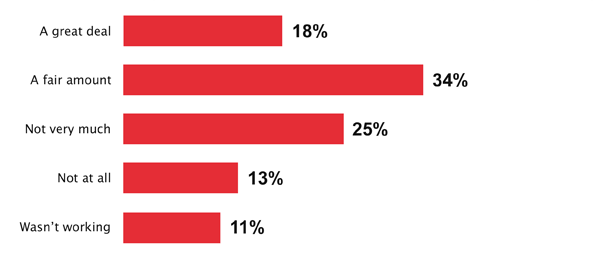
Key findings
- Unsurprisingly, we have a far more even spread of figures than those of five years later. At this point in time plenty of respondents were still in formal education, some were on a completely different career path, while others were working for organisations that had yet to make the leap from offline to the web
Data summary for professional relevance in 2001
| Extent of professional relevance | # | % |
|---|---|---|
| Total | 265 | 100 |
| A great deal | 47 | 17.74 |
| A fair amount | 89 | 33.58 |
| Not very much | 66 | 24.91 |
| Not at all | 35 | 13.21 |
| Wasn’t working | 28 | 10.57 |
Q14. What job title, if anything, did you have written on your business card ten years ago?
Description
- Made up of nodes and edges (lines), this network diagram displays the interconnected relationships between the job titles survey respondents had in 2001. The size of the primary and secondary nodes indicate the number of links between occupational groups, while the thickness of the edges indicates the weight of the relationships between two nodes
Key findings
- We still have the majority of the 227 respondents who answered this question working in the media, IT and artistic sectors, but due largely to the drop in responses, plus a fair proportion of the respondents working in unrelated fields or in formal education, the diagram appears much more spread out as a result
Comments
- Once again, I used the British Office for National Statistics’ Standard Occupational Classification 2010 coding index to categorise the job sectors
- Clicking on the above diagram takes you its visualizing.org entry, where you will be able to zoom and pan to your heart’s content
Q15. How, if at all, have your professional responsibilities and competencies changed from ten years ago?
Description
- This word cloud, created using Wordle.net, has given greater prominence to the words frequently used by the 184 respondents who answered this question
Selected quotes from the responses to this question
I used to be a sheep, and now I’m a shepherd.
Respondent #29 – Female, aged between 41-45, Canada
10 years ago web work was only a small proportion of my role. I had less authority to make major changes to content that I was putting on websites. I would pretty much put up whatever was given me, with basic QA and layout changes. Was able to develop my own IA because there was no centralized web governance at that stage.
Respondent #81 – Female, aged between 46-50, Australasia
The big change is that now my work involves close collaboration with others in UX or IA rather than IT and engineering.
Respondent #101 – Male, aged between 41-45, Northeastern United States
I actually sort of do the same thing – except digitally, as opposed to in museum galleries. Crafting messages, collecting “artifacts” [sic], organizing everything, coordinating all the players – now, I just do it on the Web.
Respondent #137 – Female, aged between 41-45, Northeastern United States
Comments
- More stories of increased responsibility and respect were to be found alongside examples of how respondents had been able to draw on the skills and experience picked up while working within other allied professions
Matchup: Q13. To what extent does your work now relate to what you were doing ten years ago? vs. Q10. To what extent does your work now relate to what you were doing five years ago?
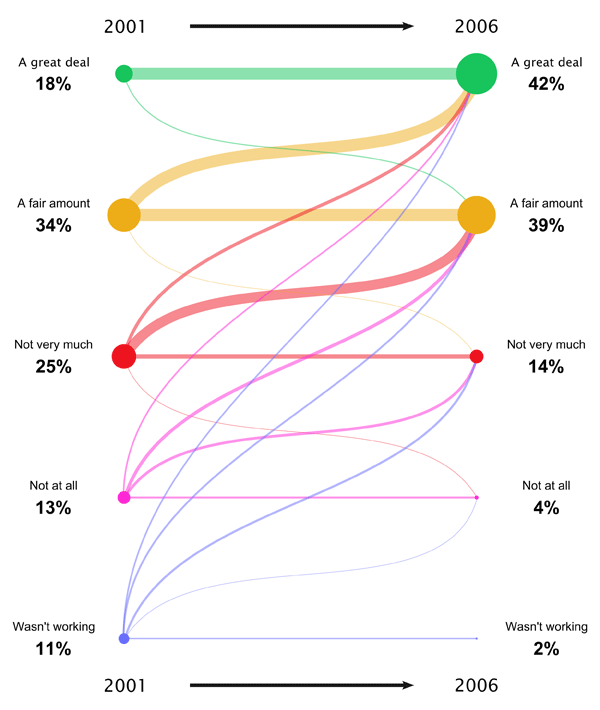
Description
- This diagram demonstrates how, in the five years between 2001 and 2006, our work gained far more relevance to the kind we’re doing today
Key findings
- 25% of respondents believed that five years on from 2001 their careers had “A great deal” of relevance to what they do today
- 30% of respondents who considered the role they were in ten years ago had “Not very much” or no relevance to what they are doing now or weren’t working at the time considered their role five years later had “A great deal” and “A fair amount” of relevance
Data summary for change in professional relevance between 2001 and 2006
| Relevance in 2001 | Relevance in 2006 | # | % |
|---|---|---|---|
| Total | 265 | 100 | |
| A great deal | A great deal | 43 | 16.23 |
| A great deal | A fair amount | 4 | 1.51 |
| A great deal | Not very much | 0 | 0.00 |
| A great deal | Not at all | 0 | 0.00 |
| A great deal | Wasn’t working | 0 | 0.00 |
| A fair amount | A great deal | 43 | 16.23 |
| A fair amount | A fair amount | 44 | 16.60 |
| A fair amount | Not very much | 2 | 0.75 |
| A fair amount | Not at all | 0 | 0.00 |
| A fair amount | Wasn’t working | 0 | 0.00 |
| Not very much | A great deal | 12 | 4.53 |
| Not very much | A fair amount | 36 | 13.58 |
| Not very much | Not very much | 16 | 6.04 |
| Not very much | Not at all | 2 | 0.75 |
| Not very much | Wasn’t working | 0 | 0.00 |
| Not at all | A great deal | 6 | 2.26 |
| Not at all | A fair amount | 12 | 4.53 |
| Not at all | Not very much | 10 | 3.77 |
| Not at all | Not at all | 7 | 2.64 |
| Not at all | Wasn’t working | 0 | 0.00 |
| Wasn’t working | A great deal | 6 | 2.26 |
| Wasn’t working | A fair amount | 7 | 2.64 |
| Wasn’t working | Not very much | 8 | 3.02 |
| Wasn’t working | Not at all | 2 | 0.75 |
| Wasn’t working | Wasn’t working | 5 | 1.89 |
What can you do with this data?
- Study the spreadsheet on Google docs
- Post your own sketches and visualisations on the Flickr group
